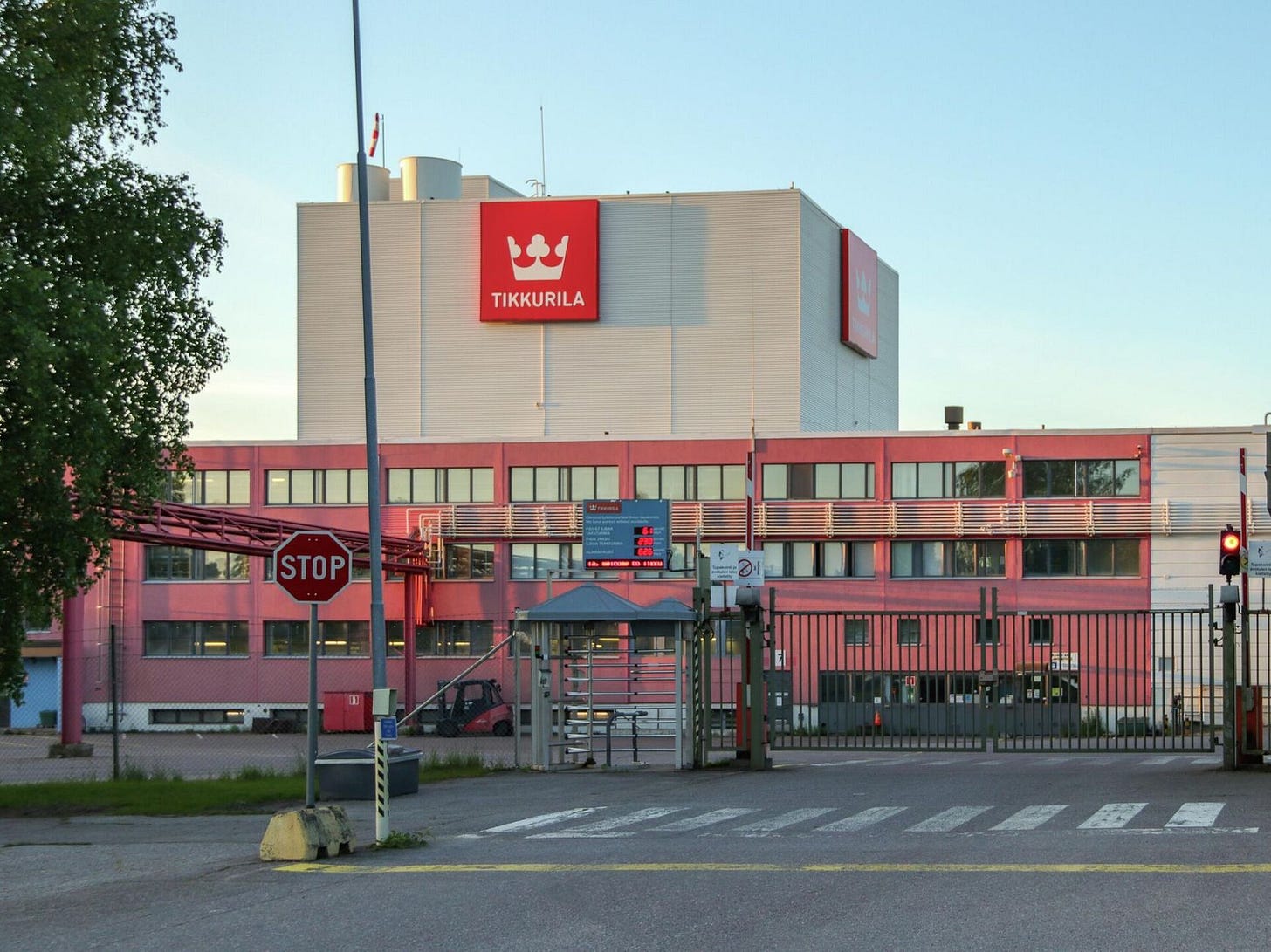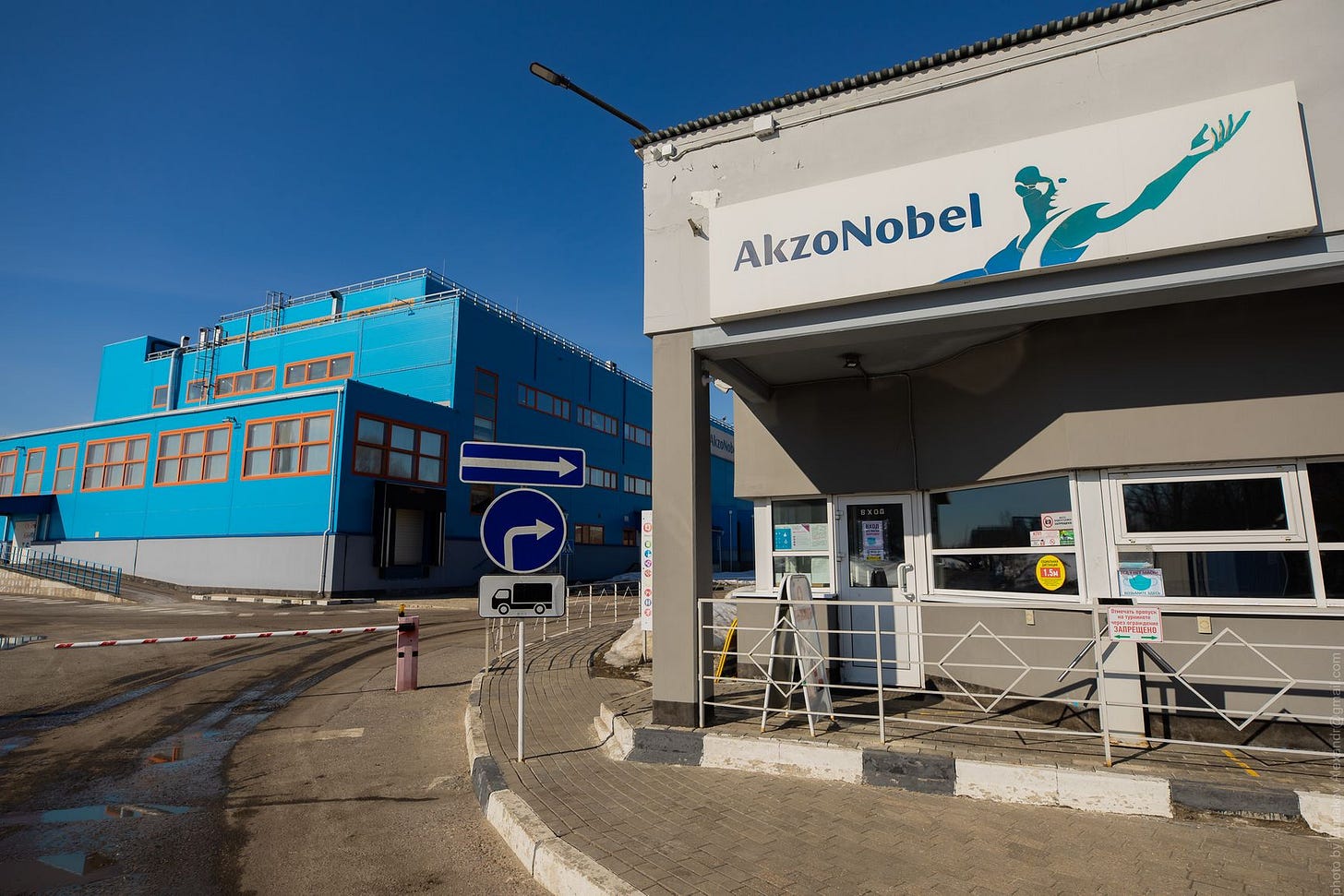The Insider: What a beauty these colors are! Tikkurila, Dulux, and Pinotex, contrary to statements, did not curtail their business in Russia
Translation of The Insider investigation
Translation of The Insider investigation
The Russian version of the investigation The Insider
30 January 2024
Contrary to statements about the curtailment of Russian business, Finnish company Tikkurila and Dutch AkzoNobel remain the largest manufacturers of paints and varnishes on the local market. Their products are purchased, among other things, by Russian security forces, and some components are supplied to the country despite EU sanctions with the obvious connivance of the parent companies.
Tikkurila’s work in Russia
Finnish paint manufacturer Tikkurila was one of the first European brands to invest in business in the former USSR. The first Russian paint and varnish plant was built in 1995. Now the brand is represented in Russia by a subsidiary of Tikkurila LLC, which is 100% owned by Tikkurila Oyj. The company owns two production sites in St. Petersburg and produces products under the Tikkurila, Tex, Finncolor, and Leningradskie Kras brands.
Tikkurila plant in the Leningrad region
Weeks after Russia's full-scale attack on Ukraine, the parent company condemned the war and pledged to donate $450,000 to humanitarian NGOs helping Ukrainians. PPG Tikkurila also announced the suspension of sales to Russian government entities subject to sanctions and promised to curtail operations in Russia, except for supplies to food and beverage packaging manufacturers.
But in reality, Tikkurila still imports foreign components to Russia for the production of paints and prepares documents for the purchase of equipment. On December 23, 2022, the company issued the EAEU declaration N RU D-ES.RA08.B.73747/22 for the import of the Spanish automatic paint dispensing line FLASH-5000-COMPACT.
The firm is also still conducting marketing campaigns in the country. In October, the brand acted as an official partner of the Moscow Interior and Design Week, and in September it participated in the largest construction exhibition City Build Russia 2023. One of Tikkurila’s recent marketing campaigns was a collaboration with Tinkoff Bank, which promised increased cashback for buyers of premium paints. The bank is under sanctions from the US and Canada.
The company has five open positions in Russia, including a brand manager who will be responsible for organizing events and exhibitions, as well as participating in the development and launch of new products. Based on this, Tikkurila clearly has no intention of curtailing its Russian business.
In October 2023, Tikkurila acted as an official partner of the Moscow Interior and Design Week
Ukraine was left without donations
The promise to donate net profits generated in Russia to humanitarian organizations supporting Ukraine failed to be fulfilled.
The profit of Tikkurila LLC from sales minus commercial and administrative expenses in 2022 increased to RUB 2.834 billion. At the same time, the company for some reason ended the year with a large net loss. How did this happen? The fact is that Tikkurila LLC spent 6.129 billion rubles. as part of the “restructuring of the Russian business of Tikkurila PPG” for the purchase of three Russian enterprises from the French subsidiary of Tikkurila, PPG Industries Europe Sarl. We are talking about Revokot Mastiki LLC, PPG Industries Lipetsk LLC, and PPG Industries LLC.
If Tikkurila's Russian subsidiary had not spent 6 billion rubles to restructure the parent company's business, the company would have had to donate billions of rubles of net profit to help Ukraine and fulfill its promise. The Insider sent a request to Tikkurila PPG about whether the company plans to direct profits from its Russian subsidiary in 2023 to non-profit organizations, but did not receive a response at the time of publication.
All three enterprises mentioned above produce automatics, which are used as sealing, anti-noise and anti-corrosion coatings, and sealants for sealing welds on car bodies. The original owner of these companies was the French Revocoat, which was acquired in 2009 by the parent company, the Finnish Tikkurila. In 2023, the former Revocoat business changed hands again.
The Russian Tikkurila almost immediately resold three companies to the construction holding Atomstroykompleks of Valery Ananyev and Pavel Kuznetsov. In October 2023, the companies were resold again, and now their owner is PC Litum JSC.
Tikkurila risks sanctions
Since July 2022, the European Union has banned the sale, supply, transfer, or export to Russia of a number of components for the production of paints and varnishes. However, the Russian Tikkurila plant imports banned materials without any problems.
Thus, on August 8, 2022, the Russian company received 1800 kg of silicone defoamer from Tikkurila Oyj, the manufacturer of which was the German Byk-Chemie GMBH. The customs documents for these goods contain HS codes included in the EU sanctions package.
In addition, the company’s paints are used by contractors who work in the occupied territories of Ukraine and supply Russian law enforcement agencies.
Tikkurila paints are used by contractors in the occupied territories of Ukraine and Russian law enforcement agencies
Since April 2022, Russian government agencies have registered 161 contracts with various construction contractors that included Tikkurila paints. These customers include:
Dulux and Pinotex. AkzoNobel’s work in Russia
AkzoNobel is one of the world's five largest manufacturers of varnishes and paints, headquartered in the Netherlands. In 2007, the company opened its own plant in Orekhovo-Zuevo, and by 2008 became the largest manufacturer of powder paints in Russia. The Russian branch has regional branches in St. Petersburg, Nizhny Novgorod, Orel, Novosibirsk, Omsk, Yekaterinburg, Chelyabinsk and Krasnodar.
AkzoNobel plant in Orkhovo-Zuevo
The Dutch company operates in Russia through three legal entities. The most popular brand among the company's paints is Dulux, the company also produces the brands Sadolin, Pinotex, Marshall, Hammerite, Tytan, and Synteko ("Sinteko").
The revenue of the AkzoNobel group of companies in Russia at the end of 2022 amounted to 16 billion rubles, decreasing by only 3% compared to pre-full scale war 2021. For 2022, AkzoNobel’s Russian branches collectively paid RUB 726.3 million to the budget. income tax.
For 2022, Russian branches of AkzoNobel paid 726.3 million rubles in income tax to the budget
Paints for civil aviation
After the start of the war, AkzoNobel published a press release in which it promised to stop cooperation with the aviation sector in Russia, as well as to freeze investments and suspend marketing activities. The document was later edited, and the current version of the company’s appeal contains only vague wording about “suspension of most of the business for the production of paints and varnishes in Russia.”
At least two indirect signs indicate that AkzoNobel paints and varnishes continue to be used by Russian aviation companies. The S7 Airlines 2022 ESG Report, published on the company's website, states that "S7 sources paint and varnish materials from the company's reliable and environmentally compliant supplier AkzoNobel, a key player in the aircraft coatings market."
At the same time, in the S7 Technics hangar in Mineralnye Vody, they paint not only S7’s aircraft but also aircraft of other airlines, including Aeroflot, Rossiya, Zoom Air, UTair, Ural Airlines, Welthal, and DreamJet "
Ilnur Shakhmaev, head of production at the S7 Technics base in Mineralnye Vody, spoke about the current partnership with both AkzoNobel and the Finnish Tikkurila in his interview: “...we use PPG and AkzoNobel materials approved by the manufacturers for painting. A similar approach applies to the selection of special consumables and washes—only those approved by the manufacturer.”
Marketing against promises
Among the AkzoNobel brands on the Russian market, Dulux is the most popular. Both the news feed on the brand’s website and the Telegram channel indicate the company’s intention to increase its share in the Russian paint market. Based on the December press release about Dulux Paints at Russian Interior Week 2023, the Russian ambassador of Dulux Paints is Elena Teplitskaya, a designer, decorator, and couturier. The second news from the same press release is that the company continues to operate the Dulux Design Studio, which provides consultations to designers.
In October 2023, Dulux introduced a new product to the Russian market - Dulux Weathershield Extraflex paint for facades and plinths. In July 2023, the company proudly reported that Dulux paints received the Russian industry quality mark of the Soyuzkraska association, which means they comply with GOST standards.
From the vacancy for a leading R&D chemist published by AkzoNobel Coatings, you can find out that the company plans to produce PVA glue with increased water resistance in Russia, and the future sales development manager for the Heritage brand will have to “develop sales and promote the luxury brand of interior paints Heritage in all channels on the territory of Russia and the CIS countries."
The group of companies' commercial expenses in 2022 exceeded 1.5 billion rubles. AkzoNobel Lakokraska LLC spent almost half a billion to support sales.
Paints for law enforcement agencies
Although AkzoNobel branches do not directly work with Russian law enforcement agencies and defense, the company itself recently reported that AkzoNobel powder paints were used to cover the temple complex of the Patriot Park of the Russian Ministry of Defense.
Also, its products reach the Russian military through intermediaries and contractors. Thus, in July 2022, a military unit in Bashkortostan purchased 375 cans of Dulux 3D White paint.
In May 2022, Clinical Hospital No. 1 of the Administration of the President of the Russian Federation purchased Dulux Bindo interior paint.
In March 2023, for the “Crimea Complex” located in occupied Crimea, the Presidential Administration purchased moisture-resistant protective glaze for wood Pinotex Ultra and colorless primer Pinotex Base.
In April 2023, the Federal Buildings Authority awarded a contract for the supply of Dulux 3D White paint and Dulux Bindo Base.
Comments in the chat of the official AkzoNobel channel, including responses from a company representative, suggest that the manufacturer is aware of the sale of its paints in the occupied territory. So, in response to a request for paint, the official account of the “Hotline for Dulux, Marshall, Pinotex, Hammerite, Sikkens paints” recommends three networks of Crimean stores with AkzoNobel products: kraskimira.org, stroy-krim.org and simferopol.kraski.ru.
Sanctions risks AkzoNobel
AkzoNobel Coatings LLC, the Russian branch of the Dutch manufacturer, received a number of sanctioned imported components.
AkzoNobel Lakokraska LLC received two supplies of pigments based on mica compounds, which are used for the production of paints.
Customs data shows that AkzoNobel's Russian subsidiaries are receiving entire batches of components for paint production that are included in the EU sanctions list. At the same time, the producers of these components are, among other things, three subsidiaries of AkzoNobel. Thus, the management of the parent company cannot be unaware of both the facts of the supplies themselves and their scale.
Russian branches of AkzoNobel receive whole batches of components for paint production, which are included in the EU sanctions list
The Insider asked Tikkurila and AkzoNobel for clarification but did not receive a response at the time of publication.
The Insider editors would like to thank the data department of the journalistic consortium OCCRP for their support in collecting data for the material.
The Russian version of the investigation is available at The Insider










